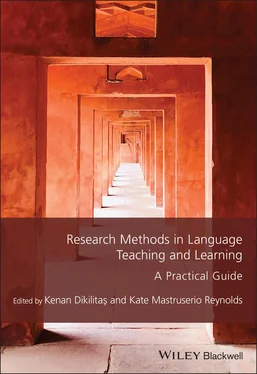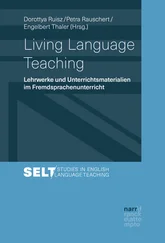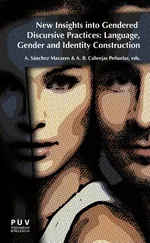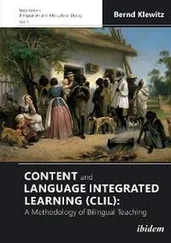Research Methods in Language Teaching and Learning
Здесь есть возможность читать онлайн «Research Methods in Language Teaching and Learning» — ознакомительный отрывок электронной книги совершенно бесплатно, а после прочтения отрывка купить полную версию. В некоторых случаях можно слушать аудио, скачать через торрент в формате fb2 и присутствует краткое содержание. Жанр: unrecognised, на английском языке. Описание произведения, (предисловие) а так же отзывы посетителей доступны на портале библиотеки ЛибКат.
- Название:Research Methods in Language Teaching and Learning
- Автор:
- Жанр:
- Год:неизвестен
- ISBN:нет данных
- Рейтинг книги:5 / 5. Голосов: 1
-
Избранное:Добавить в избранное
- Отзывы:
-
Ваша оценка:
- 100
- 1
- 2
- 3
- 4
- 5
Research Methods in Language Teaching and Learning: краткое содержание, описание и аннотация
Предлагаем к чтению аннотацию, описание, краткое содержание или предисловие (зависит от того, что написал сам автор книги «Research Methods in Language Teaching and Learning»). Если вы не нашли необходимую информацию о книге — напишите в комментариях, мы постараемся отыскать её.
Research Methods in Language Teaching and Learning
Research Methods in Language Teaching and Learning
Research Methods in Language Teaching and Learning — читать онлайн ознакомительный отрывок
Ниже представлен текст книги, разбитый по страницам. Система сохранения места последней прочитанной страницы, позволяет с удобством читать онлайн бесплатно книгу «Research Methods in Language Teaching and Learning», без необходимости каждый раз заново искать на чём Вы остановились. Поставьте закладку, и сможете в любой момент перейти на страницу, на которой закончили чтение.
Интервал:
Закладка:
Research Methods in Language Teaching and Learning
Research is one of the fundamental means of generating empirical, evidence-based knowledge to inform pedagogies and practices. Research methods employ multiple data collection tools, and methods of analysis to arrive at conclusions that may either be generalized to other contexts, or confined to narrower contexts with unique interpretations, but with implications for other contexts. In the past, research was believed to be solely quantitative, relying on statistical analysis of data; in recent decades, educational research has increasingly embraced qualitative analysis, primarily based on what participants expressed or narrated, rather than what they graded, scaled, ranked, or rated. While the former offers quantified results for levels, degrees, scores, correlation, and relation represented in numerical values, the latter reveals processes, factors, qualities, relationships, and roles represented by verbal quotations. Quantitative research explores previously identified theories and hypotheses; qualitative research allows researchers to explore how individuals or groups interact in various contexts in order to generate theories. Furthermore, educational researchers have resorted to other uniquely applicable research methodologies, such as conversation analysis, corpus analysis, and systematic review, to pinpoint answers to specific questions and conundrums in applied linguistics.
The concept of research has evolved over time and become more robust as a result of innovative methods of data collection and analysis. These methods illuminate statistically significant relationships among variables through quantitative designs or insightful understandings of issues, relationships, or phenomena through qualitative studies. In all disciplines, potential development is achieved through research. Without experiments, how can we have medicines? All medicines are tested, and their effects are measured over time before being recommended for public use. All educational designs we implement are introduced as a result of research in classrooms with stakeholders. Humans constantly need to engage in research to generate new knowledge to inform all areas of life including health, behavior, communication, learning, art, and industry. Without new knowledge and without continuously implementing new ways of doing things, progress is barely possible. Research is therefore key to human development, regardless of the discipline. No discipline can thrive without the appropriate research practices.
Much like working closely with a dedicated research mentor or sitting with a professional peer to hear about their research process, with this book we aim to contribute to the ability of researchers in light of the experiences and insights gained by others who adopted particular methods in their published research, potentially offering a powerful source of learning. Since research is closely related to, or identified with, the researcher, context, participants and methods, reading about others’ research stories could, we believe, illuminate for novice academics the knowledge that can be found in the unique implementations of the methods in particular contexts by particular researchers.
This book dodges being descriptive or prescriptive, in that it aims not to teach, but rather facilitate discovery about how regular people, who were curious and dedicated, explored through research processes, questions and concerns they had about language education. The book is relatively expository since it unpacks researchers’ experiences and their stances with reference to unique details, including how they utilized a particular research methodology with a particular phenomenon, and the challenges they encountered, and how they resolved them. These difficulties and experiences are often invisible in corresponding published research, often due to the limitation in space, and lack of direct bearing on the research results. These issues are absent in methodology books because each research endeavor is unique and idiosyncratic. For example, qualitative research is primarily characterized by its flexibility in process, which allows researchers to make unique methodological decisions while collecting and analyzing data, such as how to do interviews or how to observe a practice. This allows for innovation in the way these data generation methods are implemented. In the quantitative paradigm, on the other hand, the rules tend to be relatively more fixed and determined by statistics, though there are still decisions and challenges that need to be addressed by the researcher. Although there are major principles to follow in both paradigms, there are also stages in each, where existing rules for particular research methods may be unique to context, participants, and research topic. Such variations will accord with the particular context and methodological practices. In this book we argue that individual researchers’ experiences constitute valuable methodological knowledge for informing new research practices.
This book offers knowledge created by published researchers in the field, whose use of specific research methods is voiced on the basis of their lived experiences and written in narrative language. The very process of writing also gave these chapter authors space for revisiting their experiences and reflecting retrospectively on their engagement in research. Each researcher shares their experience in their own candid and approachable manner, so this volume makes the research processes more engaging, fascinating, and human.
We aimed to address a gap in research methods in language teaching and learning by inviting researchers to discuss explicitly their research method decisions. The lived research experiences, with reference to one or two of their own published studies, form a strong basis for verisimilitude, providing backstage transparency for the readers, highlighting challenges they faced. However, we are also cautiously aware that, however unique the interpretations of methods, the methods described in these chapters are repeated in many other studies and are recognized methods in the field.
The chapters in the book also reveal important insights into the researchers’ thought processes while using a particular qualitative or quantitative method and writing up research. Research methodology books prescribe particular given stages and procedures for researchers to follow, but tend not to focus on researchers’ intentions, choices, and realizations while considering the alternative methods.
The narrative language of the book aims to examine researchers’ intentionality, and to trace it as it is shaped by the methodological characteristics and constraints influenced by contextual elements. Rather than being directly stated, research methodology knowledge is presented in storied narrative, to enable not only richer presentation, but also deeper understanding and interpretation of the actual research processes, which might be lost in a discourse that merely offers certain implementation stages and steps to follow. Such narrative language also allows researchers to represent their multiple justifications of research processes, rather than representing research as a simple, linear process. Reflective description of research process, including methodological decisions and interpretations, is often included in the paper to enhance transparency and objectivity, and provide thick description with an extrospective stance. In addition, there is an emphasis on researchers’ orientation to their positionality in order to provide credibility and trustworthiness. The chapters in the book include stories that contribute to methodological openness and transparency, which is less likely to be represented in the published versions; these neglected stories, we argue, can bring the benefits of accessibility not only to the researchers’ internal decision-making mechanism but also to the potential opportunities to learn from outspoken justifications.
Читать дальшеИнтервал:
Закладка:
Похожие книги на «Research Methods in Language Teaching and Learning»
Представляем Вашему вниманию похожие книги на «Research Methods in Language Teaching and Learning» списком для выбора. Мы отобрали схожую по названию и смыслу литературу в надежде предоставить читателям больше вариантов отыскать новые, интересные, ещё непрочитанные произведения.
Обсуждение, отзывы о книге «Research Methods in Language Teaching and Learning» и просто собственные мнения читателей. Оставьте ваши комментарии, напишите, что Вы думаете о произведении, его смысле или главных героях. Укажите что конкретно понравилось, а что нет, и почему Вы так считаете.












